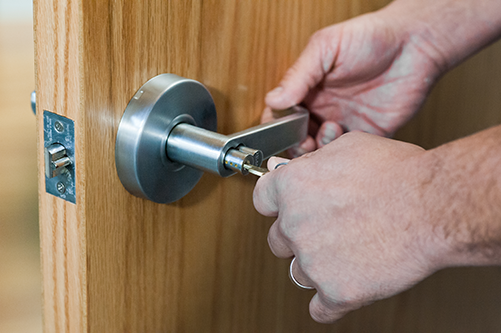 During trade show season, rekeys are one of the most commonly discussed issues at our booth. We commonly hear questions such as:
During trade show season, rekeys are one of the most commonly discussed issues at our booth. We commonly hear questions such as:
“How do I reduce the expense of rekeys?”
“What policies and procedures do I need in place for rekeys?”
The True Cost of Rekeys
There’s no way around it. Regardless of the type of cylinder you choose, rekeys are expensive.
Standard cylinders take longer to rekey, and therefore, cost more money over the long haul. In general, you will pay $25 plus a trip fee per lock that is rekeyed.
Interchangeable cylinders are much easier to rekey. In fact, your store managers can rekey them without the assistance of a locksmith. However, you still have to pay for the new cylinders and keys. Depending on the type of key system your facilities use, a new cylinder will cost anywhere from $30 to $40.
If a picture is worth a thousand words, a video is worth even more. Check out this video to fully understand why the cost of rekeys varies so dramatically.
What if I told you that there was a less expensive option? Ladies and gentlemen, let me introduce you to user-rekeyable cylinders.
User-rekeyable cylinders allow you to rekey the lock without the need to replace or re-pin the cylinder. They use proprietary technology that changes the pins in each lock chamber to match the next user key.
The two most popular user-rekeyable systems are InstaKey and U-Change.
Surprisingly, user-rekeyable systems do not cost much more than regular key systems. On average, you will pay about $10 more per core. However, they save you tons of money on rekeys.
If you install interchangeable cores at a minimum (ideally user-rekeyable systems) you will take a great step toward reducing the cost of rekeys.
Avoiding Rekeys in the First Place
“But Katie, I already have an established key system. I don’t have the budget to install new cylinders.”
If you do not have the time, interest, and/or resources to install these systems, you can still reduce the cost of rekeys. This is accomplished when you develop and implement strict rekey policies and procedures.
Rekey Triggers
First, outline which situations constitute a rekey.
There are three main triggers for rekeys:
- Lost keys;
- Stolen keys; and
- Terminated employees.
When keys are lost, we recommend only rekeying the location if the key was lost in a manner that clearly ties it back to the store.
If a key was stolen in state, you should always rekey the facility.
When an employee is terminated, you may/may not need to rekey. This will depend on the type of key system installed and whether or not the key was returned.
If your key system is on an unrestricted keyway and you feel the individual poses a threat, we always recommend rekeying regardless of whether or not you got the key back. This is because the employee easily could have copied the key without your knowledge or permission.
If you are on a restricted or proprietary system, as long as you received the keys, you do not need to rekey. There is little to no chance that someone could have made key copies. If you did not get the keys back, you need to determine if that individual poses a threat. If they do, we recommend performing a rekey.
Work Order Classification
The next policy to have in place is to clearly outline which rekeys should be emergency work orders, and which should be standard work orders.
If a key is stolen or lost in a manner that ties the key to the store, the facility is posed with an immediate threat that constitutes a same-day emergency rekey.
We also recommend emergency rekeys when you are unable to retrieve a key from a disgruntled employee, or if you are on an unrestricted system and terminate a disgruntled employee.
Generally, the only times you should perform standard rekeys are when you are unable to retrieve a key from a non-disgruntled ex-employee.
Rekey Authorization
The final policy to put in place is a rekey authorization channel.
You need to outline specific roles within your organization that are authorized to initiate rekeys. There is no right or wrong way to go about this; it is just important that everyone is on the same page.
The most critical component of this is that your key system vendor understands and enforces this authorization channel. This will help maintain the security of your key system, and will reduce the cost of your rekeys.
Do you have trouble managing the cost of your rekeys? Let us know; we’re happy to help you figure out how to decrease this line in your budget.

Good article around rekeys and avoiding them. Two solutions that tackle these very questions from Medeco are Intelligent Keys to avoid rekeys althogether and the Medeco T21 Key management system to help reduce rekeys.